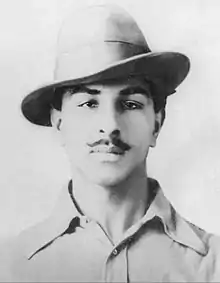Why I Am an Atheist
Why I am an Atheist is an essay written by Indian freedom fighter Bhagat Singh in 1930 in Lahore Central Jail.[1][2] The essay was a reply to his religious friends who thought Bhagat Singh became an atheist because of his vanity.[3]
Background

Bhagat Singh was a member of Hindustan Socialist Republican Association,[4] a revolutionary party in the Indian freedom struggle. He was an atheist who believed in communism, and he wrote several articles on anarchism[5] and communism for Kirti.[6] He was arrested on 8 April 1929 in connection with the Central Legislative Assembly bombing case and was sentenced to 14 years life imprisonment. He was re-arrested in connection with the murder of one Saunders, a deputy superintendent of police who was killed by Sukhdev, Rajguru, and Bhagat Singh in 1928 in retaliation for the death of Lala Lajpat Rai.[7] In that case, the trial began and he was transferred to Lahore jail. In the jail, on 4 October 1930, Baba Randhir Singh, a religious man and member of Ghadar Party who was convicted in the first Lahore conspiracy case, met Bhagat Singh and tried to incite his belief in God; however, Bhagat Singh did not change his stand. Thereafter, Randhir Singh said "You are giddy with fame and have developed an ego which is standing like a black curtain between you and the God".[2] As a reply to Randhir Singh, he wrote this essay on 5 and 6 October 1930.[8] On 7 October 1930, all three of the defendants were convicted in the murder of Saunders and sentenced to death. On 23 March 1931, they were executed by hanging in the Lahore jail (present-day Shadman Chowk or Bhagat Singh Chowk).[9]
Publication
After the death of Singh, the essay was published on 27 September 1931 in Lala Lajpat Rai's English weekly The People.[10]
Tamil version
On the request of Periyar E. V. Ramasamy, P. Jeevanandham translated the essay to the Tamil language. The Tamil version of the essay was published in Kudi Arasu in 1935. According to Chaman Lal, "at one time after Partition, the English copy of this essay was not found anywhere. It was then re-translated from Tamil to English, and some websites still carry the re-translated English version of this essay".[11]
Contents
| Wikisource has original text related to this article: |
In the essay, Bhagat Singh states that his atheism was not a result of vanity. He mentions that his family were firm believers in God, that he himself grew up as a religious boy who would chant prayers for hours and goes on to explain how despite this he went on to become an atheist.[3] He mentions that his atheism was also not a result of his association with a revolutionary organization and that most of his comrades were in fact theists, citing the example of Sachindra Nath Sanyal who was a firm believer in God. An excerpt from the essay reads:
He also questioned theists about the existence of God.[3]
References
- http://scroll.in/article/715660/on-bhagat-singhs-death-anniversary-why-i-am-an-atheist
- "Bhagat Singh on atheism and death". Ahmedabadmirror.com. 18 April 2012. Retrieved 17 February 2014.
- "Why I am an atheist". Frontline.in. 2 November 2007. Retrieved 18 February 2014. Cite magazine requires
|magazine=(help) - S. Irfan Habib (22 March 2008). "Bhagat Singh as seen by Ramasami Periyar". The Hindu. Retrieved 18 February 2014.
- Habib, S. Irfan (23 March 2019). "Revolutionary ideas that live on". The Hindu. ISSN 0971-751X. Retrieved 23 March 2019.
- Maia Ramnath (1 January 2012). Decolonizing Anarchism: An Antiauthoritarian History of India's Liberation Struggle. AK Press. pp. 17–. ISBN 978-1-84935-082-2.
- "Martyr Bhagat Singh lost in red tape on India's 67th Independence Day". India Today. 14 August 2013. Retrieved 23 February 2014.
- "Is the BJP turning Marxist-Leninist?". Tehelka. 2 October 2004. Retrieved 18 February 2014.
- Anita Joshua (30 September 2012). "It's now Bhagat Singh Chowk in Lahore". The Hindu. Retrieved 18 February 2014.
- V. N. Datta (11 March 2007). "Understanding Bhagat Singh". Tribune India. Retrieved 18 February 2014.
- B. Kolappan (22 August 2011). "Periyar admired Bhagat Singh, criticised Gandhiji". The Hindu. Retrieved 18 February 2014.
